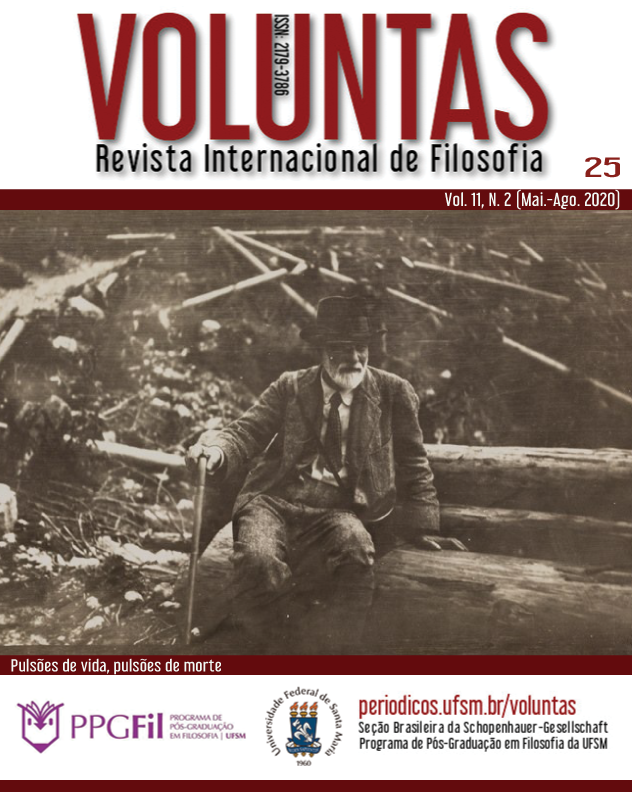The past of an illusion and the future of a tragedy
DOI:
https://doi.org/10.5902/2179378644494Keywords:
Psychoanalysis, Death instinct, Culture, EntropyAbstract
From the Freudian developments about civilization, we will question how, in view of the imminence of a tragic future, the question of alternative forms of enjoyment can originate a less hostile society. Starting from notions such as death drive, aggressiveness and Super-Self, we will see that the rationalization of affections does not claim our destructiveness. From the antinomy between Eros and Thanatos, Freud calls for the independence of aggressive drives, understanding that civilization is experienced as malaise. Pointing out how the other's desires are implicated in ours, we will see that aggressiveness establishes the Super-Self, whose function is to impose on the Self the same hostility that the latter would wish to satisfy on others. Exercising internal authority, the Super-Self goes through subjectivity, indicating that there is nothing that does not guarantee our own catastrophe. But if civilization is built on the rest of individual freedom, then perhaps accountability for desire will allow us to think about new forms of subjectivity and, perhaps, in a less hostile society.Downloads
References
ARISTÓTELES. Ética a Nicômaco. 4. ed. São Paulo: Edipro, 2014.
DEIGH, J. La Ultima Teoría da la Civilización de Freud: cambio e implicaciones. In: JEROME, N (org.). Guia de Freud. Gran Bretaña: Cambridge University Press, 1996, p. 344-369.
ENRIQUEZ, E. Da Horda ao Estado: Psicanálise do Vínculo Social. Rio de Janeiro: J. Zahar, 1990.
FREUD, S. O Mal-Estar na Civilização. In: FREUD, S. O Mal-Estar na Civilização, Novas Conferências Introdutórias à Psicanálise e Outros Textos. São Paulo: Companhia das Letras, 2010, vol. XVIII.
FREUD, S. Por que a guerra? In: FREUD, S. Edição Standard Brasileira das Obras Psicológicas Completas de Sigmund Freud. Rio de Janeiro: Imago, 1996.
GARCIA-ROZA, L. Introdução à metapsicologia freudiana. v. III. Rio de Janeiro: J. Zahar, 2014.
LACAN, J. O seminário, livro 7: a ética da psicanálise, 1959-1960. 2. ed. Rio de Janeiro: Zahar, 2008a.
LACAN, J. O seminário, livro 11: os quatro conceitos fundamentais da psicanálise. Rio de Janeiro: Zahar, 2008b.
LAPLANCHE, J.; PONTALIS, J. B. Vocabulário da psicanálise. São Paulo: Martins Fontes, 1986.
ROUDINESCO, E.; PLON, M. Dicionário de psicanálise. Rio de Janeiro: J. Zahar, 1998.
SANTOS, R.; DALBOSCO, J. A afirmação da finitude como possibilidade para a responsabilização do desejo: notas a partir de Heidegger e Lacan. Griot: Revista de Filosofia, v. 19, n. 1, p. 215-225, 28 fev. 2019.
Published
How to Cite
Issue
Section
License
The submission of original manuscripts to this journal implies the transference, by the authors, of the copyrights for printed and digital publication. The copyrights of a published manuscript belong ultimately to the author, and only the copyright for its first publication is reserved to the journal. Authors may only use the same results in other publications explicitly indicating this journal as the medium of the original publication.
Licence
Attribution-NonCommercial-ShareAlike 4.0 International (CC BY-NC-SA 4.0) - This license lets others remix, tweak, and build upon your work non-commercially, as long as they credit you and license their new creations under the identical terms.







